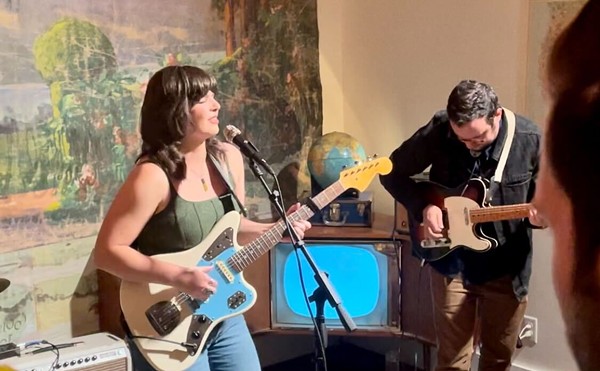Yet by the time he made the Foos' second album, 1997's The Colour and the Shape, Grohl's ambition had begun to shine through the cracks of his increasingly substantial songwriting. For one thing, he actually assembled a band, hiring Sunny Day Real Estate agents Nate Mendel and William Goldsmith, along with ex-Germs (and occasional Nirvana) guitarist Pat Smear, to help lift his music out of his cozy home studio and the band out of its questionable side-project status.
"One of the reasons why we put out the second record so quickly was because we didn't want people to think that it was a side project," Grohl says on the phone from LA, where he now spends most of his nontouring time. "I was really pretty careful with everything on the first album. I didn't wanna just jump out and make videos right off the bat." Then, after forming the live band, "We jumped in the van and started doing some touring before we let the whole thing go," he says. "We tried to hold it back as long as we could."
Once freed from self-imposed constraints, the band quickly began to grow into itself. As an alt-rock record, Colour is about as slick as they come, but there's also a clear-headed gravitas to it that late-'90s rock fans were getting only in a lamebrained version from Bush; take another listen to "Everlong" and notice how much bristly post-punk tension Grohl fits into such a pretty melody. Before the recording of Colour's follow-up, 1999's There Is Nothing Left to Lose, the band experienced one of its frequent lineup shuffles: Smear departed and was replaced by Scream/Wool guitarist Franz Stahl (who later was replaced by No Use for a Name member Chris Shiflett), and Goldsmith made room for current drummer Taylor Hawkins. Nothing suffers from the instability -- nice singles, but, at an hour, a little bland.
There are no such problems on the recent One by One. It's the band's best work yet, a tight wad of pummeling guitar roar and Hawkins's faux-Grohl drumming that's balanced by neatly defined melodies and Heavy Things to Say About Life. If you've had issues with the Foo Fighters before, this disc dissolves them: no power-pop flippancy, not much studio gloss, no boring tunes. Still, tell Grohl that he's pretty much commercial rock's lone representative for folks who identify with serious guitar music, and he'll try to rationalize his way out of it.
"To me, the sweetest songs aren't the ones that are made by fucking cute kids with pierced eyebrows," he says. "They're a little more emotionally twisted than that. Bands like Hüsker Dü or bands like Rites of Spring or bands that have this raw, emotional rock music -- that always touched me the most."
Grohl remembers his days in the mid-'80s Washington, D.C., hardcore scene, when he drummed with the Dischord Records outfit Scream -- a place and time that have come to be known as emo's ground zero. "A lot of the music in the punk-rock scene had lost any relevance or any meaning. There were bands that were still ultrapolitical, like MDC or Dead Kennedys, but for the most part, music was lacking something. So you had Rites of Spring and Embrace, where the emotional quality of the music was on ten. It was a fucking trip. Going to a show, and afterwards half the audience is in tears -- what the fuck is that all about? I was, like, fifteen, so to me music was just about taking acid and getting laid and being death metal."
Actually, for the 34-year-old Grohl, that last bit still holds true, to a degree. He famously took a break from the Foo Fighters last year to fill the revolving drum seat in the blitzed hard-rock California outfit Queens of the Stone Age, playing on the band's acclaimed Songs for the Deaf and hitting the road for a spate of high-profile live shows. Grohl says he loved the sabbatical from his frontman duties, as well as the opportunity to indulge the baser pleasures that he's all but phased out of the Foos' repertoire. One by One displays Grohl's background in metallurgy, too (don't forget the straight-up stoner cut he sported as a Nirvana member), but he sighs wearily at the notion that it's the result of the Queens' influence.
"Going back to the Foo Fighters and making a rock record, it was, like, 'Oh, now this shit's rocking. And there's melody to it? Yeah, that's Queens of the Stone Age,'" Grohl snorts dismissively. "You know what? Go buy the fucking first Foo Fighters record, listen to a song like 'Weenie Beenie' or listen to a song like 'Exhausted.' Whatever.
"The reason why it's heavier than the last one is because each record is sort of a response to the last. For [Nothing] we wrote all these mellow mid-dynamic songs that don't really have anything to do with the distortion pedal, and [we] had a great time recording them in the studio in my basement. Then we went out on tour, and we only played maybe five or six songs off that record. So this album, it was, like, 'OK, we gotta make eleven songs that we're gonna play every night.' And we were writing as a band in a little tiny room, so those are the kind of riffs that come out; those are the kind of songs that we enjoy playing when we're writing. It was about pleasing ourselves and feeling like we've gotta make a record that's gonna make us happy for the next two years on the road."
They've evidently done that. Grohl says that he begged his management for a single month free of band goings-on, but, after four days without playing, he was "seriously frustrated," itching to work again. "I just can't stop," he laughs; then he pauses: "But that's good, right?"





